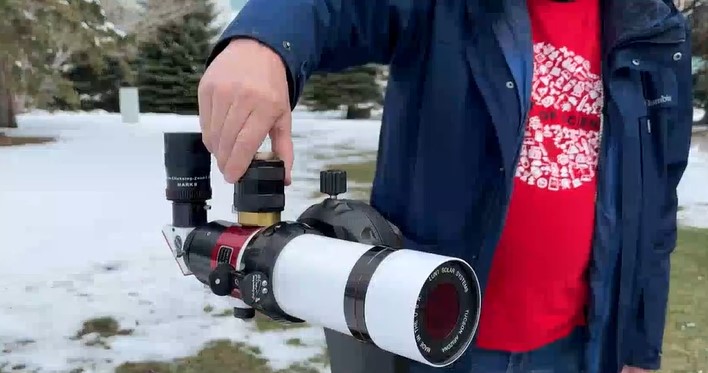Calgarians will see a partial eclipse rather than the full one on Monday, but experts say with the right preparations, it’ll still be a spectacle worth looking up for.
The rare celestial event is happening on Monday across North America, and depending on the location, the solar eclipse will look different.
When the penumbra arrives in the southwestern corner of Ontario just before 2 p.m. EDT, a partial eclipse will be followed by a total eclipse starting at about 3:12 p.m., according to Eclipse2024.org.
“The way it’s going to travel is from down in Mexico up through Texas eastern seaboard of the U.S. and then Eastern Canada and then into the ocean,” Zack Anderson, the director of Science Connections at TELUS Spark, told CityNews.
“So here in Western Canada, we’ll see it’ll still block out part of the sun.”
The length of the total eclipse will depend on how close you are to the centre of the path of totality, which on April 8 will skirt the southern edge of Lake Erie and the southeastern corner of Lake Ontario.
Related Stories:
While the best views will be from southern Ontario, other parts of Canada will still get to see a spectacle.
“So in Calgary, the partial eclipse will look like a big round cookie where somebody took a bite out of,” said Jeroen Stil, an associate professor of astronomy at the University of Calgary.
“Until the light disappears, which is spectacular.”
Don’t look up at the eclipse
Some students at the University of Calgary shared concerns about potentially damaging their eyes, with some opting for a live stream or staying indoors.
The retinas can be damaged with prolonged staring at the sun, which is called “solar retinopathy,” and the damage can happen without feeling any pain, according to The Canadian Association of Optometrists.
“The injury can be temporary or permanent,” a notice reads.
The Calgary Board of Education and Catholic School Board have sent communications to warn parents about the serious impacts on vision if viewing the eclipse unprotected.
Students will remain indoors during that period of time.
The only time to look at the eclipse without glasses is when the moon fully covers the sun during totality, which is expected to last just over four minutes. This won’t pass for Calgarians, so it’s recommended to be mindful if you choose to view the eclipse during this time.
However, this also comes as the American Astronomical Society warns of counterfeit glasses being sold online.
It says that safe solar viewers block all but a minuscule fraction of the sun’s ultraviolet (UV), visible, and infrared (IR) light.
“We used to recommend that you make sure the eclipse glasses you’re buying come from one of the manufacturers on our list,” the AAS said.
“But now that we know that fake, unsafe eclipse glasses are being misrepresented as coming from at least one of these manufacturers, we need to urge a more cautious approach.”
Where can Calgarians watch the partial eclipse?

Several events have been planned across the city, with telescopes and special glasses being made available to watch the eclipse safely.
UCalgary’s Rothney Astrophysical Observatory (RAO) will have a pop-up observatory on campus for the day.
There will be a limited amount of solar telescopes and a limited amount of eclipse sunglasses
The pop-up observatory will be in Green Space #20 near the engineering buildings and Taylor Institute.
Tickets are $10, but they are sold out. However, people can sign up to be on a waitlist.
Calgary’s own TELUS Spark partnered with the Royal Astronomical Society of Canada (RASC) for an eclipse viewing.
RASC is bringing in telescopes and glasses for those who show up. One pair of glasses will be provided per family.
There will also be a viewing from the Spark’s Atrium.
Lastly, Calgary’s Ambrose University will also have a partial solar eclipse viewing. The school also partnered with RASC, and there will be telescopes and astronomers on site.
“Everyone is welcome so make sure to invite your friends and family to witness the phenomenon,” a social media post reads.
The event is at 150 Ambrose Circle SW.
If you can’t make it and are choosing to stay in, there will also be a livestream of the event online hosted by the Royal Astronomical Society of Canada.
People can sign up online to watch the coverage, which the University of Toronto will show. There will be correspondents and experts along the path of totality.
Experts say the solar eclipse will last about two hours, starting after 11:30 a.m. and wrapping up about 1:30 p.m.
The eclipse on Monday will be the first total solar eclipse visible in Canadian provinces since Feb. 26, 1979.
If you miss it, they say the next solar eclipse will happen in 20 years on Aug. 22, 2044, when a total eclipse will be visible from the western coast.
With files from Lucas Casaletto and The Canadian Press